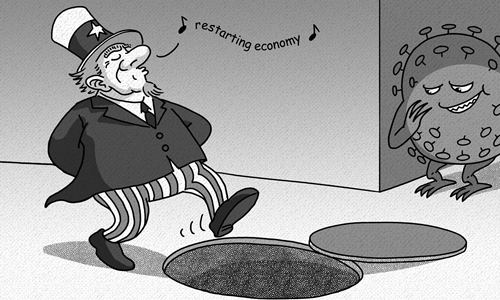China should always be in crisis mode: Global Times editorial
Source:Global Times Published: 2020/5/26 22:01:25

Illustration: Liu Rui/GT
Countries are gradually reopening. For many Chinese, the US and some European countries do not meet the conditions to ease social distancing rules. In the past few days, the US has seen a few hundred daily deaths and more than 10,000 daily confirmed cases. The situation is much more severe than China's worst times, but large-scale reopening still started.
It is too early to tell what such reopening means. Easing social distancing rules will bring new infections and deaths. Amid twists and turns, Western countries could probably ride over controversies and adapt to the fact that the fatality rate of COVID-19 is higher than the flu.
Obviously, these countries do not have the ability to organize strict social distancing to lower their confirmed cases to zero. Meanwhile, society needs to reopen. The two realities merge and force Western societies to reopen, which might make Western societies tolerant of more deaths.
Most of those who died of COVID-19 are the elderly and the vulnerable, among whom the poor take up the majority. Setting aside humanitarianism, their deaths do not generate much loss to their countries, so people seem to have nothing to fear about economic reopening.
But once the pandemic resurges, it will definitely weaken the efficiency of Western countries' resumption of work and production. The ease of the situation in these countries is not the result of herd immunity, but economic stopover. It is possible that these countries will return to economic suspension again.
China has taken a unique anti-virus path and achieved remarkable progress. New confirmed cases have almost reached zero in the Chinese mainland. The tests China faces next are different from those that confront the US and Europe.
First, according to China's standards, these countries are still pandemic areas. While they reopen to each other, China also faces the political and economic pressure to open its door to them, which will be bound to result in an increasing number of imported cases. What should China do?
Second, Western countries are more tolerant of high numbers of confirmed cases and deaths than China. While the West has more discourse power, they may misinterpret China's humanitarian principle. China may not be able to stand on a high moral ground in the conflict with them.
China has effectively put the epidemic under control. Although other countries envy China's situation, the US may exploit the chance to woo countries, which hold a sour grapes mentality, to find fault with China.
To dilute these risks and challenges, China must make sure its economic recovery is faster than that of the US and its allies. China should also set up the capability to prevent a second wave of infections while opening more immigration channels. Without any of them, China may be caught in a passive position with great uncertainties, even if it achieves anti-virus success.
It seems that the US, whose epidemic situation is in a chaotic situation, badly needs a vaccine for the novel coronavirus. From a wider perspective, China, which has almost cleared infectious cases, need the protection of the vaccine more. The virus has resulted in appalling changes in world patterns, and more changes cannot be ruled out in the future. China is not in a position to boast. It must always keep a sense of crisis and fight for the better.
Posted in: EDITORIAL